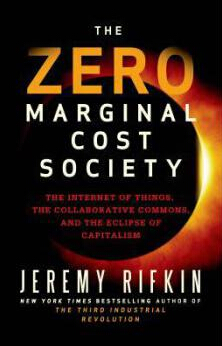Rifkin: China can lead global shift to sharing economy
- By Sarah Bellemare
 0 Comment(s)
0 Comment(s) Print
Print E-mail China.org.cn, October 17, 2014
E-mail China.org.cn, October 17, 2014
At a press conference held in Beijing on Oct. 16, economist and international consultant Jeremy Rifkin explained his belief that the "sharing economy on the collaborative commons" will become the dominant economic paradigm of the international economy by 2050. Rifkin also expressed hopes that China's construction of a national renewable energy sharing platform will spearhead the world's shift towards the new collaborative economic model.
 |
|
Jeremy Rifkin's latest book, "The Zero Marginal Cost Society: The Internet of Things, the Collaborative Commons, and the Eclipse of Capitalism." [Photo/Amazon.com] |
Rifkin is in Beijing to promote the release of the Chinese edition of his latest book, "The Zero Marginal Cost Society: The Internet of Things, the Collaborative Commons, and the Eclipse of Capitalism," published in China by China Citic Press. The English edition of the book, Rifkin's 20th major work, was released in the United States in April.
"The Zero Marginal Cost Society" explains how three dimensions of the developing internet of things -- the communications internet, the fledgling renewable energy internet, and a developing GPS-guided logistics network -- will allow individuals to produce, distribute and share products and information at extremely low costs. Though Rifkin does not believe that capitalism will disappear, he does think that the current exchange model of capitalism "is going to be utterly transformed" as a result of its coexistence with the sharing economy.
A professor at the University of Pennsylvania's Wharton School of Business and president of the Foundation on Economic Trends, Rifkin has served as a consultant for governments and major international organizations throughout the world. His work with the European Union and with the government of German chancellor Angela Merkel to create a comprehensive plan to build green and sustainable economies in Europe has gained international acclaim. The plan has also won the support of the United Nations Industrial Development Organization.
In September 2013, Rifkin made a trip to China to consult with several key government organizations and leaders, including Vice Premier Wang Yang and Science and Technology Minister Wan Gang, about the implementation of the five key concepts he described in his bestselling book "The Third Industrial Revolution," published in 2011. Less than three months after Rifkin's visit, China State Grid Corporation announced plans to create a digital, laterally-integrated, peer-to-peer national energy-sharing platform, funded with US$82 billion in government funds over four years.
Rifkin spoke highly of State Grid's plan at Thursday's press conference, describing it as "a big deal" and a major factor in China's transition into "an idea power." As a result of its focus on the democratization of renewable energy production and distribution, "China may be leading the world to a more democratic and a more ecologically-based society with a decent quality of life," Rifkin stated. "[China's] plans call for merging the energy internet with the communication internet and an emerging logistics and transport internet. And then hopefully that internet of things platform will cross Asia -- a pan-Asian platform -- and then hopefully China can come together with Europe across Eurasia and create a new space for humanity," he continued.
In fact, the expansion of renewable energy plays a pivotal role in Rifkin's assertions about the development of a zero marginal cost society. Rifkin's model of the development of near-zero marginal costs is premised on the open availability of extremely cheap energy, which he believes can only be accomplished through the democratization of energy production made possible by the rapid expansion in the use of renewable energy sources.
Rifkin also emphatically stated that his fears about climate change were his ultimate reason for writing this book, saying that he was deeply concerned that the realities of climate change mean that "our species is imperiled with potential extinction." "Zero marginal cost means we are so productive and so efficient that we minimize the use of resources and energy and materials. … I don't know of any other way to combat climate change," he asserted.
Although "The Zero Marginal Cost Society" has been generally well received, some readers and reviewers have voiced criticisms that Rifkin's ideas do not address the problems of the continued existence of the fixed costs of producing of renewable energy and goods. Others have cautioned that corporate monopolies in the technology sector will prevent the collaborative commons from challenging the capitalist system.
Rifkin told reporters that he acknowledges there are many factors which might hinder the development of a near-zero marginal cost society, threats to network neutrality and the issue of cyber-terrorism being chief among them. But Rifkin also dismissed the possibility that monopolies will be an obstacle to the collaborative commons, saying that only smart companies who see the advent of the sharing economy as an opportunity will be able to survive in the third industrial revolution.
The Chinese edition of "The Zero Marginal Cost Society," which includes a special introduction not included in the original English version, was released in China on Oct. 15, 2014 and is now available for purchase online and in stores.






Go to Forum >>0 Comment(s)